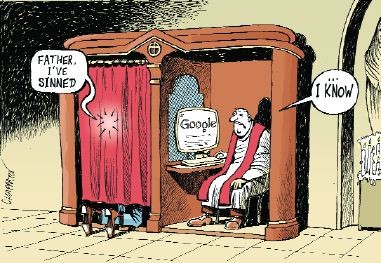Century Marks

Getting to know you: When Margaret Feinberg took a class from poet Maya Angelou at Wake Forest University, she found that the first session was taken up with students introducing themselves and spelling their names. At the outset of the second and third sessions, Angelou went around the room again to review the students’ names. After the third time, Angelou asked, “Why did I just spend nearly 20 percent of our very valuable class time together making sure you knew each other’s names?” After a deafening silence, she answered her own question: “Because your name is a sign of your dignity. And when you recognize someone’s name, you recognize them not just as human but as a person. One of the greatest ways you bestow human dignity on someone is by calling them by name” (The Organic God, Zondervan).
Sad story: Gordon Mikoski, who teaches at Princeton Theological Seminary, notes that the Lord’s Supper helps us to remember sorrow. “So much of our American life is built on triumph and success and beauty and happiness. . . . The Lord’s Supper isn’t really about those things. It’s about remembering a very sad story . . . [about] loss and death.” To lift up sorrow and loss does two things, he says: it helps people to deal with their own sorrow and loss, even feelings of godforsakenness. And it helps people move toward solidarity with others having such experiences (Cloud of Witness audio journal, Volume 11).
Are you hefted yet? The word hefted is used to describe sheep that have an inbred sense of place. Sheep that are hefted can be left to roam freely, as they will not stray from the land that they know very well. They instinctively can locate therapeutic plants to eat and, on the basis of the wind, where they will most likely find shelter when needed. Humans too have a strong sense of place: who we are is tied closely to where we are. Our place doesn’t necessarily have to be where we were born or raised; it can be any place where we have a sense of belonging, feel part of a community, and are connected to a natural landscape and observant of its seasonal rhythms—and, from a faith perspective, where we feel some connection with the sacred (Expository Times, August).
Back to your roots: EcoEternity is offering a green form of burial: for a price the company will place a person’s remains in a biodegradable urn and plant it beside a mature tree. In time, the remains will be soaked up by the tree’s root system. EcoEternity has partnered with Camp Highroad, a United Methodist camp in northern Virginia, where three acres will be set aside for this purpose. Small tags will identify the names of the deceased; tombstones and plastic flowers will be forbidden. The price for leasing a tree starts at $4,500. Up to 15 family members can be interred under one tree over a span of 99 years (Washington Post, October 8).
Origins of self-help: It has been 100 years since the publication of William James’s Pragmatism. Before it appeared, James boasted to his brother Henry that he wouldn’t be surprised if the book would be “rated as epoch-making.” Indeed, James’s work on pragmatism started a philosophic revolution. Because James believed in other realms of consciousness and that higher energies can be harnessed for human empowerment, he might also be considered the father of modern self-help spirituality. “The ecumenism of the self-help genre is also quintessentially Jamesian,” says Theo Anderson. For James, “spirituality is presented as an unmediated relationship between the individual and the divine. Institutions only get in the way” (Wilson Quarterly, Summer).
Another martyr? Rami Ayyad, an evangelical bookseller in Gaza and director of the Protestant Holy Bible Society, was abducted, shot and stabbed to death earlier this month. Accused by local Muslims of spreading the gospel, he had received numerous death threats. While attacks on Christians are rare in the Palestinian territories, incidents have increased since the June takeover of the Gaza Strip by Hamas. The leader of the Islamist Hamas movement has vowed to find the killers, saying that Christians and Muslims “are one people waging a single struggle for independence and freedom.” Relationships between the 30,000 Christian Palestinians and 1.5 million Muslims in the Gaza Strip have generally been good (AKI, October 8).
Double bind: Giving to aid the needy is one of the five pillars of Islam. American Muslims are increasingly under pressure to make sure that their gifts to the needy aren’t used by organizations connected with terrorism. This is particularly difficult in relation to Gaza, the West Bank and southern Lebanon, where there is great human need and where Hamas and Hezbollah, considered by the U.S. government to be terrorist organizations, dominate the dispensing of social services. Moreover, the raiding of Islamic charities based in the U.S. has put the Muslim community here on edge. “It is difficult because you want to be a good Muslim and at the same time you do not want to do anything against your country,” said one American Muslim during the recent Ramadan season (Detroit News, October 5).
Bible shopping: As Donald Capps was browsing in a bookstore’s religion section, he encountered a woman surveying the Bibles. “There are a lot of so-called Bibles here,” she said to him in frustration, “but I can’t find a single King James Bible among them.” He was tempted to ask her if she knew that King James was estranged from his wife, Queen Anne, and is believed to have had male lovers. Such facts, he suspected, would have undermined her sense of the sacredness of the KJV translation (Pastoral Psychology, July). King James’s character has, in fact, been the subject of some concern and debate in conservative Christian circles that are devoted to the KJV.





